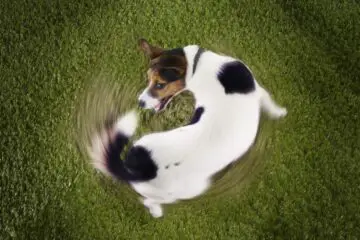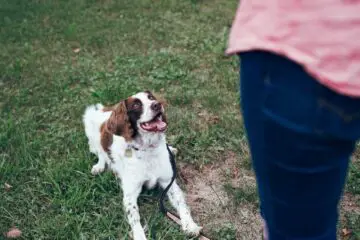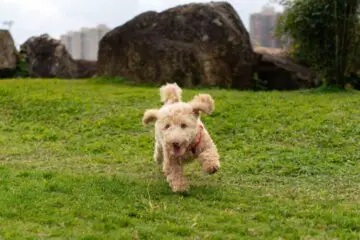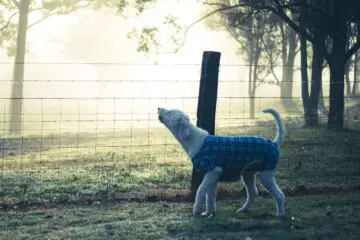Key Takeaways
- Panting helps dogs regulate their body temperature and cool down after exercise or excitement
- Excessive panting can mean anxiety, pain, heart disease, respiratory problems or another medical condition ⚠️
- If your dog has been panting for a long time without apparent reason, take them to the vet for a check-up ⚕️
- To help your pet calm down, give them plenty of water and rest in a cool area
Why is my dog panting so much? In this article, we’ll take a closer look at why dogs pant and offer some tips on how to deal with excessive panting. It could be a sign of a health issue, in which case you should take your pup to the vet. Read on to learn more!
Why Do Dogs Pant? Normal Dog Panting
Panting is a natural, normal behavior in dogs. It helps them regulate their body temperature and cool down after exercise or excitement. Dogs don’t sweat through their skin like humans do, so they rely on panting to evaporate moisture from their tongues and respiratory passages. Panting also helps to circulate oxygen-rich blood throughout the body and is an efficient way of getting rid of carbon dioxide.
Some breeds of dogs, such as Bulldogs and Pugs, are more prone to panting due to their short muzzles. These breeds can have difficulty breathing and may pant excessively in hot weather or after exercise.
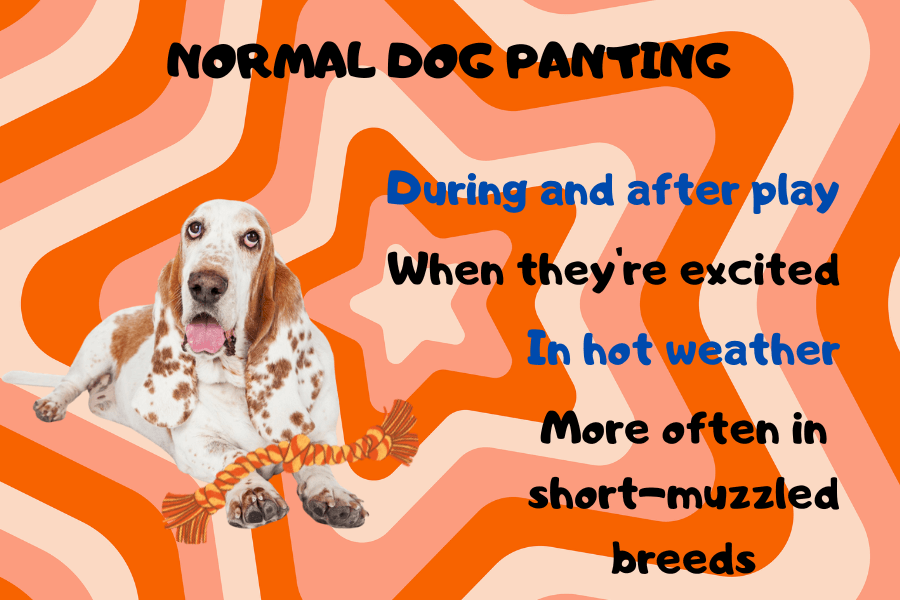
Why is my dog panting so much? Let’s take a look.
When Do Dogs Pant?
Dogs typically pant when they are overheated, excited, or exercised. It’s normal for your pet to pant on a hot day or after a long walk or play session.
But what if there is no apparent reason? Panting too much can be a sign of anxiety, pain, heart disease, respiratory problems, or another medical condition. If you can’t figure out what’s wrong with your dog, take them to the vet for a check-up.
What Are the Signs of Excessive Panting?
If you’re wondering “why is my dog panting so much?”, pay attention to other symptoms. In addition to excessive panting, these may include:
- increased heart rate;
- anxiety or restlessness;
- pacing;
- drooling;
- difficulty breathing;
- lethargy or fatigue;
- collapse;
- coughing;
- whining.
If your dog is exhibiting any of these signs, take them to the vet – they’ll get to the bottom of the problem.
Why Is My Dog Panting So Much? Common Causes
Why is my dog panting so much? There are many reasons that can make your dog pant excessively.
Anxiety or Stress
If your pup is panting continuously and looking distressed, he may be experiencing anxiety or stress. It’s vital to seek the advice of a veterinarian to determine how best to help him cope with his suffering – don’t wait until it escalates into physical pain!
Heart Disease
Heart disease is a common cause of excessive panting in dogs. If your dog has heart disease, he may have difficulty breathing, and you may notice that his gums are pale or blue.
Why is my dog panting so much? There are more reasons, read on!
Respiratory Problems
Dogs with respiratory issues may have difficulty breathing, and you may notice that their gums are pale or blue. If you think your dog may have airway problems, have a vet listen to their lungs.
Poisoning
If your beloved pup has been acting strangely, they may have gotten into something toxic! Look out for warning signs such as panting and drooling, vomiting or diarrhea, and/or overall weakness. Don’t hesitate to call the vet if you suspect poisoning – it’s a medical emergency.
Heatstroke
When your pup begins panting excessively, it could be a sign of something much more serious than them getting too hot. Heatstroke is an emergency medical condition that requires immediate attention from the vet to avoid potentially deadly consequences for your furry friend!
Laryngeal Paralysis
Laryngeal paralysis is a condition that affects the muscles of the larynx (voice box). Dogs with laryngeal paralysis may have difficulty breathing, and you may notice that they pant excessively.
Adrenal Glands, Cortisol Imbalance
The adrenal glands produce a special hormone called cortisol which keeps your dog’s body running smoothly. Unfortunately, if these levels are not kept in check, it can cause an array of issues such as panting – the telltale sign that something is off kilter within their system!
Heavy Panting in Dogs – When to Go to the Vet
Is your pup panting more than normal? Consulting a vet is essential to ensure they aren’t suffering from an underlying medical condition. It could be something as simple as the temperature being too hot, or it may be poisoning – which needs to be addressed immediately! Talk with your veterinarian and get peace of mind that you’re doing all you can for Fido’s well-being.
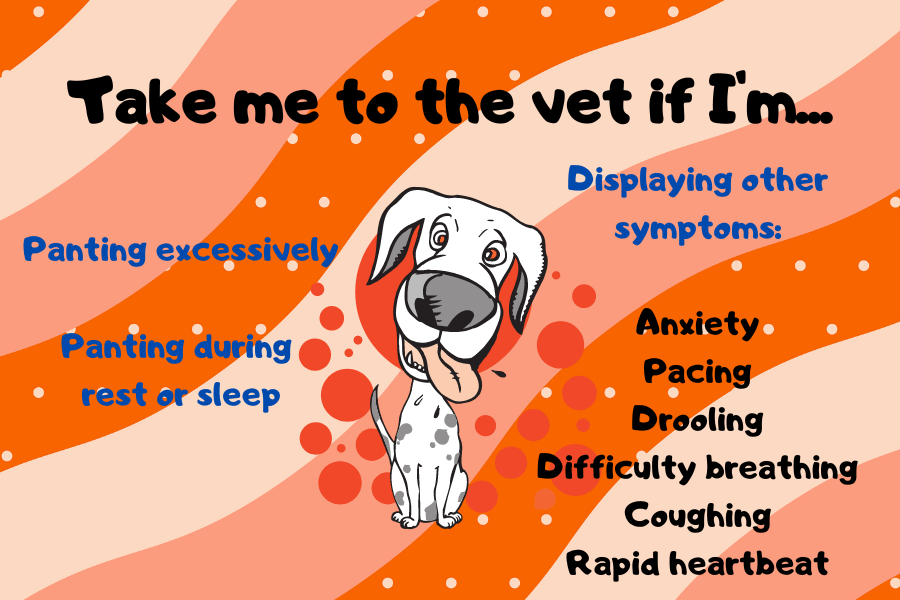
Our Reader’s Story
I noticed something strange one night when I was watching my dog, Nacho, sleep. He was panting heavily, and it seemed like he was having a hard time breathing. I knew this wasn’t normal, so I took him to the vet the next day. The vet ran some tests and determined that Nacho had a respiratory infection. He prescribed antibiotics and told me to keep an eye on him for any changes in his breathing or behavior.
I followed the vet’s instructions and kept Nacho on the antibiotics for the full course of treatment. After a few weeks, I noticed that his breathing had improved, and he seemed to be back to his old self. I was so relieved that I’d caught the infection early and that Nacho was feeling better.
How to Help a Dog That Is Panting Heavily
Why is my dog panting so much? How can I help? Follow these steps:
- Call your vet: if you’re concerned about your dog’s panting, it’s always best to talk to your vet. They will be able to give you advice on whether it’s something to be concerned about, and they may be able to offer some veterinary treatment options.
- Provide a calm, quiet environment: if your dog is panting excessively, it’s important to provide him with a calm, quiet environment.
- Avoid strenuous exercise: if your dog is panting excessively, it’s important to avoid strenuous exercise. This can make the problem worse, and it can also be dangerous for your dog.
- Give your dog plenty of water: if your dog is panting excessively, it’s important to make sure he has plenty of water to drink.
- Help your dog cool down in hot months: if your dog is panting excessively in hot weather, it’s important to help him cool down. This can be done by providing him with a cool, shady spot to rest in and by giving him plenty of water to drink.
- Monitor your dog’s weight: if your dog is overweight, this can contribute to excessive panting.
FAQs About Dogs Panting
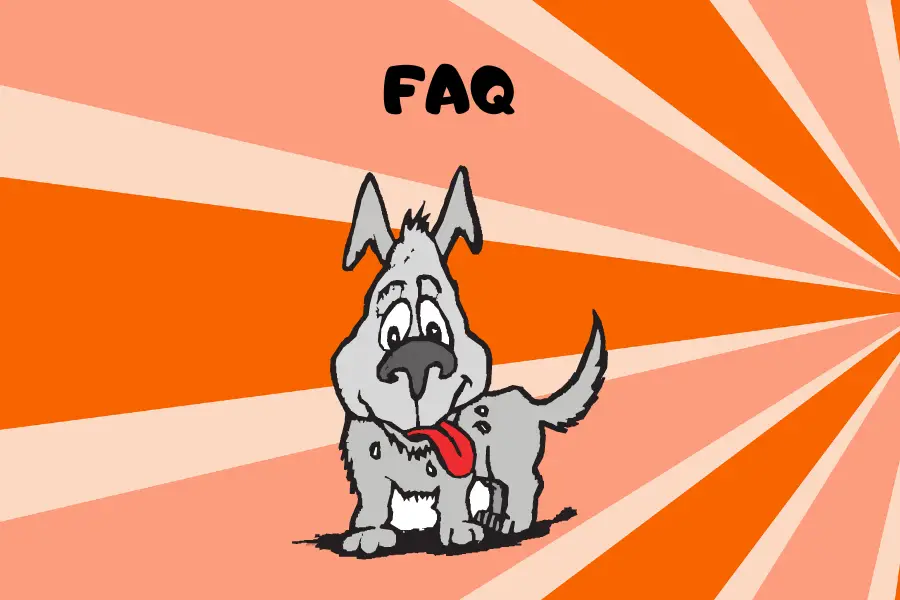
When Should I Worry About Dog Panting?
If you’re noticing that your dog is excessively panting – or displaying other signs such as lethargy, shaking, changed behavior/appetite, restlessness or pain – then get them checked out by a vet right away! But if they’re only panting for a bit after playing fetch or running on a hot day, there’s no need to worry.
Why Is My Dog Panting So Fast While Resting?
Anxious panting while resting is usually a sign of respiratory distress. If your pup has shallow and labored breathing, coughing/gagging, excessive drooling or reluctance to eat, drink and move, then it’s time for you to seek help – don’t wait!
How Do You Calm a Dog Down From Panting?
When your pup is hot or tired after playing, a cool spray of water and some time in the shade can help them chill out. For extra refreshment on those sweltering days, offer some special treats like an icy ice cube or frozen toy! If your pal’s panting seems to come from stress rather than heat exhaustion, taking them for a nice stroll with lots of love ensures their anxiety will melt away.
How Long Is Too Long for a Dog to Pant?
Has your pup been panting for what seems like an eternity? It could be a sign of overheating or illness, so if it lasts more than 10 minutes, you should definitely seek medical attention. Look out for other symptoms such as dry and sticky gums, bright red tongue, thick saliva, vomiting or diarrhea – any combination can mean serious trouble!
Do Dogs Pant When in Pain?
Yes, dogs can pant when in pain or stress. If you suspect that’s the case, show them some extra love and create a soothing sanctuary they can retreat to until they get professional help.
Lucas Taylor is a veterinary assistant, freelance journalist and single dad who lives in the suburbs with his three pups: Ruby, Nala, and Woody. He has one cat named Pepper. When he’s not writing articles or working at the vet clinic, Lucas loves cooking French cuisine for himself and friends at home. One of Lucas’ favorite things to do is paddleboard with his son Noah and their canine companions. Pepper is the homebody of the bunch – she loves chilling on the couch.
